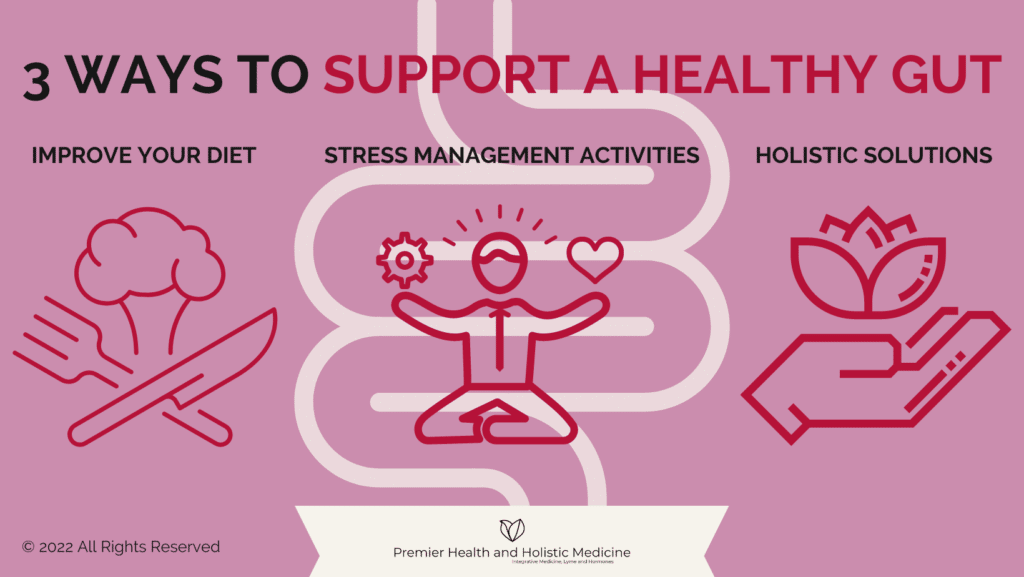Have you ever heard of your “second brain?” If you haven’t, you’re not alone. But believe it or not, your second brain contains more nerves than the spinal cord.
Containing more than 100 million neurons, the network of nerve cells lining the digestive tract – your gut – is so extensive that many medical professionals have nicknamed it the body’s second brain. And this is for good reason. Your gut has more influence over your health than you might realize. This is why taking care of your gut and developing quality gut health can have a huge impact on your overall wellness.
Do you want to know more about how gut health affects your body? Dr. Ridinger practices integrative medicine and can give you a holistic guide towards better overall health, beginning with your gut. Call Dr. Ridinger in Leesburg, Virginia for a consultation today.
What Is Gut Health?
Your gut is a microbiome, full of bacteria that can either help or reduce your overall health. This little universe within the body not only houses beneficial bacteria that we humans need to digest food and survive, but it is also home to potentially harmful bacteria and yeast. And having quality gut health is all about striking a balance between the two.
Fun Fact: Approximately 80 percent of your immune system can be found within your gut. In addition, the majority of your body’s serotonin can be found in the gut as well. This means that poor gut health can potentially decrease the functionality of your hormones and immune system, making it difficult to regulate mood, and stress, or combat anxiety and illness.
Additionally, gut health can also influence the following:
- Weight Regulation
- Metabolism
- Mental Health
- Cognition (concentration and memory)
- Heart Health
- Energy and Stamina
- Sleep Patterns
Overall, gut health is critical to foundational health. And the gut-brain connection can be traced back many centuries in medical journals found across the globe. In fact, the connection between what we eat and how we behave runs quite deep. So, the saying “you are what you eat” may hold more truth than we might realize.
How To Spot Signs of an Unhealthy Gut
Understanding how gut health affects your body is one thing – but knowing the signs of an unhealthy gut is critical for diagnosis and for correcting the problem holistically. As such, a few factors to consider that may cause an unhealthy gut are as follows.
Stress
Stressors in your life can cause a condition known as intestinal permeability, otherwise referred to as a leaky gut. When this occurs, the balance between good and potentially harmful bacteria can be thrown off and you may find yourself with more harmful bacteria thriving in your gut.
Nutrition
Poor nutrition, such as eating large quantities of processed foods and sugary foods, can cause harm to the beneficial bacteria living in your gut. This can also lead to inflammation throughout the body if poor dietary health isn’t corrected.
Antibiotics
Both antibiotics and antacids commonly used for heartburn or indigestion can reduce the amount of B12 within the gut. And this is directly related to your cell growth, energy levels, and proper brain function. As such, ensure that you’re only taking antibiotics and antacids as recommended by your physician.
Symptoms of an Unhealthy Gut
With an unhealthy gut, you may experience flu-like symptoms at times, or common gastric issues such as bloating, excessive gas, diarrhea, and/or constipation. However, these are not the only symptoms of poor gut health.
Further symptoms of poor gut health can manifest as autoimmune diseases such as rheumatoid arthritis, Hashimoto’s Disease, Multiple Sclerosis (MS), Type 1 Diabetes, and other immune disorders that can become problematic due to your immune system attacking different parts of your body.
Additional symptoms of poor gut health may include:
- Brain fog
- Fatigue
- Poor memory
- Difficulty concentrating
- Chronic pain
- Insomnia
- Odd cravings
- Poor mood
- Headaches
As you can see, gut health not only affects your physical body but your mental and emotional states as well. This is why holistic therapy is highly recommended to treat poor gut health because you have to treat the entire body and mind in order to help regulate your inner microbiome.
How to Support a Healthy Gut

Though each patient will have different symptoms and corresponding treatments, a majority of patients can improve gut health through lifestyle modifications, and by practicing mindfulness. And this is largely accomplished by implementing a healthy diet and managing your stress.
Improving Your Diet
When it comes to correcting poor gut health through diet, the reason for improving your diet relates not only to a better quality of overall health but also helps in reducing the factors that are causing poor gut health in the first place. This largely relates to getting the nutrition that your body needs along with reducing toxins that can cause imbalance within your gut.
In most cases, being able to identify and remove food allergens from your diet is a great start to improving gut health. This can be done by minimizing the number of processed foods, sugar, and refined carbohydrates that you consume. In addition, focusing on organic, grass-fed meats along with adding fermented foods such as Kefir and Kimchi can also work to support quality gut health.
When it comes to modifying your diet, a diet consisting of natural fibers, fruits, and vegetables along with understanding your own dietary triggers that can cause inflammation is often a highly recommended approach. However, each patient’s dietary regimen will be different in order to achieve optimal gut health for the individual.
Stress Management
Stress can wreak havoc on your life and your body. And holistic gut health includes mental health treatments as well. This is because of the gut-brain link that affects us more than we realize. What affects your gut also affects your mental and emotional states. And this is why stress management can be extremely helpful when looking to improve gut health.
A few activities to implement for stress management are as follows:
- Yoga
- Regular Meditation
- Tai Chi
- Regular exercise
- Adjusting sleep patterns
- Unplugging
Stress can manifest without any indication, and before you realize it, you could be on your way to dealing with chronic stress. If this occurs, your gut health could suffer even more. Remember, chronic stress can cause inflammation throughout the body as well as reduce the effectiveness of your immune system – and this is largely regulated by your gut.
Noticing stress and modifying your lifestyle to cope with or reduce it entirely is a highly recommended method used widely in holistic therapy. Even if this includes unplugging and reducing screen time by just a half hour each day, you may begin to see the benefits of reduced stress sooner than you think.
Seeking Holistic Solutions
Gut health is one area of the body that should always be treated holistically. As mentioned, your gut is often referred to as the “second brain.” And this intricate mesh of neurons is actually pretty smart. It will respond to whatever you consume. With this in mind, it’s important to remember that what we consume can have a profound effect not only on the physical body but on your mental health as well.
Holistic therapies are designed to treat the entire individual. Often, diet and lifestyle modifications are usually recommended. But you may also have underlying health conditions that also need treatment before your gut health can be corrected. And this is where holistic treatment may be the most beneficial.
A holistic therapist may have the solutions that you need to fit your life the best. And with a little bit of time and effort, you’ll soon be well on your way to better gut health – and correspondingly toward better overall health.
If you think you have poor gut health and want to treat your condition through holistic therapy, request an appointment at Premier Health and Holistic Medicine.


